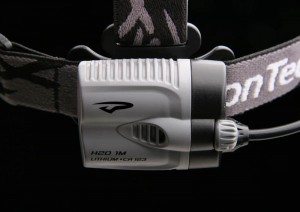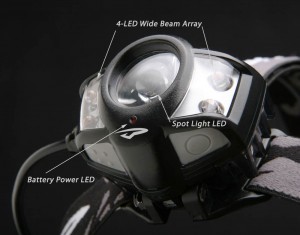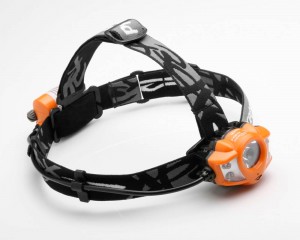Princeton Tec’s Apex Pro has been my headlamp of choice for the past five years. It hasn’t been an unblemished record, but the pros continue to outweigh the cons. Nary a day goes by that I don’t use it, whether taking the dog for a walk after dark, hunting for a dropped widget in the dark corners under a desk, adding illumination for a bit of repair work, or an early rise for a dawn patrol tour. For smaller tasks, like reading, cooking, a lighter weight headlamp could do the task but I like using a single tool for as many purposes as possible, especially when you want serious illumination power, which the Apex does like a pro.
The Apex Pro is not a light weight headlamp, so it isn’t meant to be an emergency light that you stuff in your pack just in case. It isn’t a tank either, but that is a relative term as well. The Apex Pro fits in the heavy weight category because it doesn’t skimp on any of the features I look for in a headlamp which are: lots of light, adjustable intensity, long battery life, and a top strap. Durability is important too, but my experience dictates Princeton Tec only rates a B there (more on that below). I’m a heavy user, not a bruiser abuser.Let there be LIGHT!
It has five LED’s to provide lots of light, one of which is a single LED 200 lumen hi-beam spot light, plus an array of four LED’s that kick out 40 lumens of medium range, wide beam light that can toggle down to 20 lumens, or flash.
The trick to providing lots of light from an LED is to be able to bleed off the heat generated. Light Emitting Diodes are more efficient than incandescent bulbs, but that efficiency is short lived unless the heat generated is conducted away. Thus, to shunt the heat created by the 200 lumen bulb the Apex Pro has a serious rack of aluminum on the backside of the bulbs to keep this unit cool.
Lithium-Ion Power
Power comes from a pair of CR123 lithium batteries, mounted on the back of the circumferential headband, connecting to the light housing with a substantial hunk of wire. As with most Princeton Tec products, the Apex Pro is sealed against water, so they work in the rain, or under water to at least 3 meters (as long as you seal the battery case tight).

Water sealed battery pack holds two CR123 lithium-ion batteries. Waterproof to 1M depth for 30 minutes.
The most obvious one is a small LED in the lower front that pulses green when the batteries are strong, orange when they’re getting weak, and red when they’re on the brink of collapse. That blinking indicator also helps when you trying to find the headlamp in the dark.

Five LED's plus a battery power indicator are housed in the front lamp assembly. The pulsing indicator helps to find it in the dark.
The second and main reason you may not like the CR123’s though is the cost of replacement. If you buy them at your local retail shop they’ll break that portrait of Andy Jackson with not even enough change for a Mars bar. But, if you shop the internet and buy a batch of ’em, you can get ’em for around $2.00 apiece. With a little forethought and planning you can buy a years worth for the same $20 (BrooklynBatteryWorks).
If you really hate the CR123 concept, you can get the plain Apex instead which uses a battery pack that holds 4 AA batteries. Not worth the reduction in battery life with alkaline AA’s, but worth it if you’re using rechargeable batteries, or lithium-ion AA’s. Another benefit of the Apex is it is rated for many more hours of use — 150 VS 35 hours for the Pro version. However, as a result of using four AA’s, the Apex is noticeably heavier.
Headband
Most of the light weight headlamps use a single elastic band. Those are fine for short periods of use, but over time if the elastic band is tight enough to stay put, it is also tight enough to restrict blood flow. In my experience, that spells headache, especially at altitude. A top strap lets the lamp rest on your head without having the cinch it tight, and the Apex Pro comes with that standard. If you don’t like it, take it off.
Conclusion
The only thing I’m not impressed with on the Apex Pro is the plastic. I’ve gone through three of these in the course of five years. Each one has required replacement because some portion of the plastic broke when they were inevitably dropped. None of those drops should have been catastrophic, but they were. Combine that with an MSRP near $100 and you have the ingredients of a serious flaw, except for the fact that Princeton Tec offers a lifetime warranty.
In fact checking the power of the light from the Apex Pro I mentioned this flaw and was assured that the plastic on the main housing has been modified to be less brittle, and the spacer which provides friction for adjusting the angle of the headlamp has also been beefed up. I know from experience that they do honor the lifetime warranty, and the replacements, though still not bombproof, were each progressively stronger and less prone to breakage.
Will I get another? Definitely, just as a backup while I’m getting the current one replaced, although I think I’ll get the plain Apex so I can use rechargeable batteries on the “spare”.
Princeton Tec
Apex Pro
MSRP: $95
Weight: 173 grams (6 oz.)
Batteries: 2x CR123
Apex
MSRP: $90
Weight: 279 grams (9.8 oz.)
Batteries: 4x AA


1 ping
[…] debilitating injuries to the plastic case either rendering them useless, or crippled. Twice my Princeton Tec Apex cracked when accidentally dropped to the ground from less than four feet. The lifetime warranty […]